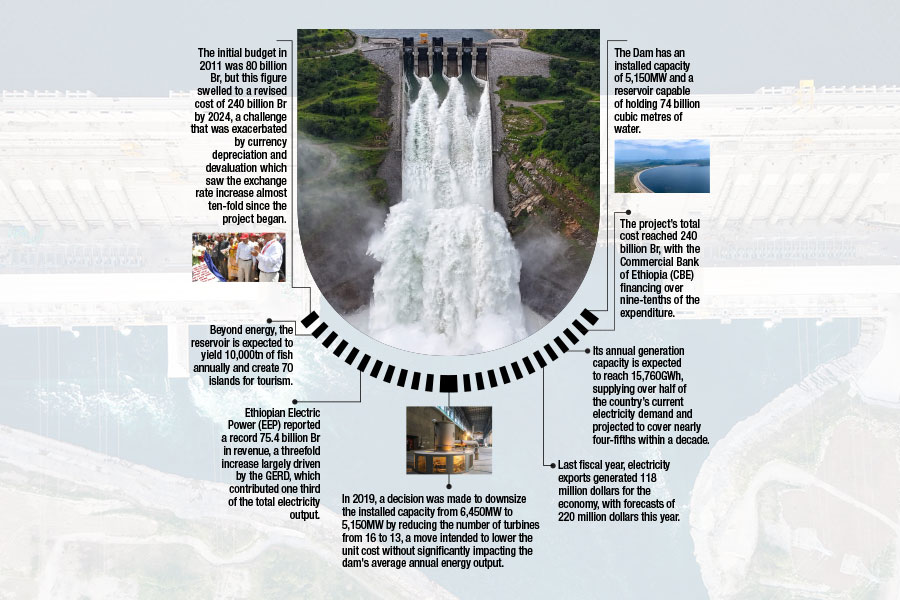
Photo Gallery | 154926 Views | May 06,2019
Mar 2 , 2025
By Senay Lemma
Mikel Arteta’s blueprint for Arsenal offers parallels with robust business strategy. His approach to rebuilding the club from the bottom up, standing by a strategic vision, and creating an organisational culture is often what it takes for businesses to claw back a lost market share. A clear direction paired with firm leadership can make a tangible impact, as evidenced by Arsenal's improved positioning under Arteta's watch, argues Senay Lemma (senaylemma2@gmail.com), a senior human capital advisor.
Mikel Arteta’s tenure at Arsenal began in late 2019, when the football club was reeling from a lack of direction and a string of poor performances. He had never managed a senior team before, and his appointment raised questions about whether someone with limited experience could revive one of England’s most popular clubs. Yet, over the past few seasons, he has guided Arsenal from drifting in mid-table to genuine title contenders.
Today, however, his critics point to one glaring fact: Arsenal has yet to win a major trophy under his leadership. With a game in hand, they remain 13 points behind Liverpool in their quest for the Premier League title. His team has been eliminated from both the FA Cup and the League Cup, and its chances in the Champions League appear slim where there is fierce competition and limited attacking options.
Arteta’s reputation so far is defined by ambition, controversy, and a vision for cultural change. He arrived during a difficult period, taking the job from Unai Emery after a run of seven winless games. The atmosphere around the Emirates Stadium was bleak. The once-dominant force in English football had become a club of underachieving stars, expensive contracts, and fan commotion. Some questioned whether the former Arsenal midfielder, who had been Pep Guardiola’s assistant at Manchester City, could survive a locker room of jaded veterans and frustrated youngsters.
But from the outset, he spoke about accountability and a winning mentality, emphasising the need to reshape not only the starting 11 but the entire culture. He wanted a disciplined, possession-based style, built on defensive stability and a high work ethic.
Arteta’s leadership offers lessons that go beyond soccer. His story at Arsenal is about rebuilding from the ground up, standing by a strategic vision, and creating an organisational culture that prizes discipline and respect. For businesses, these elements are critical for sustained success. A brand that has lost market share can be compared to the Arsenal Arteta first encountered. Hardly any clarity on objectives, demoralised personnel, and inconsistent performance. What he did next reveals how strong leadership and a clear direction can make a tangible impact, even if final victory remains elusive.
One part of his blueprint is the emphasis on culture.
Arteta famously identified three core values at Arsenal: respect, commitment, and passion. He demanded the same from everyone, regardless of stature or salary. With those values in mind, he made tough choices. He left out star players whose dedication fell short and introduced youngsters who embraced his vision. Adhering to such principles, he also brought in David Raya as a goalkeeper when some fans felt they already had a sufficient option.
The backlash was instant, yet over time, most supporters came to see that it strengthened competition within the squad.
He proved passionate about building an identity that had faded away in the years since Arsene Wenger’s departure. Still, as the heavyweight champion Mike Tyson famously said, “Everybody has a plan until they get punched in the mouth.” Arteta experienced that firsthand. He made moves that unsettled portions of the fan base, including omitting Mesut Ozil from the squad and stripping Pierre-Emerick Aubameyang of the captaincy. Those decisions revealed his determination to reinforce discipline, but they also brought fierce backlash.
Arsenal’s early results were unpredictable, revealing a team that often struggled to adapt to Arteta’s approach. Calls for his removal were deafening, but the Arsenal board backed him. They believed his holistic vision, focused on disciplined play and player development, outweighed short-term stumbles.
Over four seasons, Arsenal’s results improved. They moved from eighth place in 2019-2020 to fifth, and then to consecutive second-place finishes in the two most recent campaigns. Last season, Arsenal fell short of the trophy, finishing just two points behind City – less than the margin of a single victory. Which was a heartbreaking and regrettable outcome.
This progress convinced many supporters that Arsenal might finally claim their first league title in two decades. Although the promise of a breakthrough season has not panned out, fans have seen a team that looks organised, committed, and far more capable of competing at the highest level.
Unfortunately, a recent defeat to West Ham and a draw to Nottingham Forest destroyed any lingering hope that this season would be different, echoing the near-misses of Arsene Wenger’s later years.
Discipline is crucial in business, too. Leaders should establish clear standards of behavior and hold everyone accountable, particularly in high-pressure situations. Allowing a big-name employee to disregard company values can sap morale and damage unity. By cutting ties when certain players defied his principles, Arteta showed a coherent culture is more important than any single talent. The core idea here is that no individual should overshadow the collective. Arteta seems to have taken to heart the lesson from Alex Ferguson's conviction not to lose control.
He also showed that leadership sometimes means playing the long game. Arsenal’s board could have removed him early on, but that might have meant restarting the entire process. Arteta kept repeating that the Club should “trust the process,” ultimately, some of those who had criticised him became ardent supporters once they saw how the team’s performances improved. In business, too, shareholders and executives sometimes push for immediate returns, without realising that structural or cultural overhauls take time. Organisations that cycle through leaders in rapid succession often experience chaos, with new strategies introduced before the old ones have been tested.
Arteta’s approach to recruitment is another valuable lesson. Rather than chase flashy names or expensive superstars, he sought players who fit into his tactical approach. His method resembled identifying root causes of failure before looking for solutions. Arsenal historically struggled with defensive organisation. He prioritised building from the back. He also sought individuals who would embrace his emphasis on discipline.
In a corporate environment, a company facing strategic challenges could benefit from looking at specific problems — whether a gap in digital marketing or a shortfall in customer analytics — and hiring individuals who can address those weaknesses, rather than pursuing the biggest name in the industry.
His ability to motivate and transform players speaks to the power of mindset. Granit Xhaka, who was once booed by fans and considered a liability, became a fan favourite under Arteta. That transformation required confidence, accountability, and tactical clarity.
In an office setting, managers can replicate this by identifying employees’ strengths, boosting their self-belief, and setting clear expectations. When people feel backed by their leaders, they often exceed what they believed possible. This pattern has played out repeatedly at Arsenal, with several previously maligned players reinventing themselves under Arteta’s guidance.
But leadership has to be tested in adversity. Arteta endured a barrage of criticism as Arsenal failed to secure silverware. When supporters saw their team stumble at crucial moments, many pointed to errors in recruitment or in-game decisions. For example, Arsenal found themselves short on striking options this season. With four players already injured the team is forced to play without a striker. This left a glaring void up front, as the Club tried to chase down Liverpool. Critics asked why the Club had not reinforced this position sooner or planned for contingencies. This shortfall recalls previous seasons when injuries in defense or midfield undermined promising starts and outcomes.
The lesson for businesses is that overreliance on certain individuals without proper backups can become a single point of failure. Just as a soccer team can falter if it lacks depth in key areas, a business can stall if it relies on a handful of employees or one product line without developing alternatives or planning for disruptions.
Arteta’s story serves as a reminder that a blueprint could be essential for success, but if leaders fail to anticipate setbacks, the entire structure may collapse. In soccer, that might mean a late-season injury crisis. This could be an unexpected shift in consumer behavior or a sudden regulatory change in business. Companies that do not invest in depth and contingency planning often pay a higher price when problems arise. Arsenal’s repeated inability to sustain its title challenge, even in years when rivals stumble, underlines how failing to address apparent weaknesses can become an ongoing, costly issue.
The Club's leadership decisions, from benching high-profile players to sticking with a long-term plan, demonstrate the weight of unpopular moves. Business leaders who take bold steps, even in the face of criticism, can create environments that reward initiative, but they should be prepared for backlash. Short-term discomfort often arises when a company removes a well-known executive or folds a familiar product line. Over time, though, these steps might prove to be catalysts that remove distractions or toxic influences and free up resources for growth.
For the fan base, the question is how long the patience will last if trophies do not materialise. For the first time in years, Arsenal looked like a formidable opponent for top clubs, and fans appreciated that transformation. Yet the frustration remains. Their exit from domestic cups and their chase behind Liverpool says, once again, that this year might end without silverware. For businesses, this is akin to seeing a brand reestablish itself in the market, improve customer satisfaction, and gain positive media coverage, yet consistently lose deals to a competitor. The basics are strong, but the final push for dominance remains elusive.
Arteta’s story is not complete. His legacy will depend on whether he can guide Arsenal to a title. Many see similarities to the later Wenger years, when Arsenal came close but failed to challenge the era’s dominant teams. Others believe that the structural changes and cultural shift under Arteta can eventually bring Arsenal the trophy that has evaded them for two decades. Regardless of how the next season unfolds, his tenure has shown that rebuilding a struggling organisation requires more than one or two quick fixes. It demands a coherent identity, discipline within the ranks, steady leadership, and a willingness to address core vulnerabilities.
In business, these elements resonate. Leaders who define clear visions, invest in talent strategically, and reinforce discipline in times of crisis can reverse a downward spiral. They may face setbacks, harsh criticism, and initial results that fail to impress. Yet, a consistent approach can gradually reshape operations and revive brand image. As Arsenal’s experience shows, getting close to the top can still be disappointing if failing short of the ultimate goal. But, for organisations accustomed to mediocrity, striving for greatness often begins with a cultural shift and a belief that the team can compete at the highest level.
PUBLISHED ON
Mar 02, 2025 [ VOL
25 , NO
1296]


Photo Gallery | 154926 Views | May 06,2019

Photo Gallery | 145195 Views | Apr 26,2019

My Opinion | 135113 Views | Aug 14,2021

Photo Gallery | 133650 Views | Oct 06,2021

Dec 22 , 2024 . By TIZITA SHEWAFERAW
Charged with transforming colossal state-owned enterprises into modern and competitiv...

Aug 18 , 2024 . By AKSAH ITALO
Although predictable Yonas Zerihun's job in the ride-hailing service is not immune to...

Jul 28 , 2024 . By TIZITA SHEWAFERAW
Unhabitual, perhaps too many, Samuel Gebreyohannes, 38, used to occasionally enjoy a couple of beers at breakfast. However, he recently swit...

Jul 13 , 2024 . By AKSAH ITALO
Investors who rely on tractors, trucks, and field vehicles for commuting, transporting commodities, and f...

Sep 13 , 2025
At its launch in Nairobi two years ago, the Africa Climate Summit was billed as the f...

Sep 6 , 2025
The dawn of a new year is more than a simple turning of the calendar. It is a moment...

Aug 30 , 2025
For Germans, Otto von Bismarck is first remembered as the architect of a unified nati...

Aug 23 , 2025
Banks have a new obsession. After decades chasing deposits and, more recently, digita...

Sep 15 , 2025 . By AMANUEL BEKELE
The Grand Ethiopian Renaissance Dam (GERD), Africa's largest hydroelectric power proj...

Sep 13 , 2025
The initial budget in 2011 was 80 billion Br, but this figure swelled to a revised cost of 240 billion Br by 2024, a challenge that was exac...

Sep 13 , 2025 . By BEZAWIT HULUAGER
Banks are facing growing pressure to make sustainability central to their operations as regulators and in...

Sep 15 , 2025 . By YITBAREK GETACHEW
The Addis Abeba City Cabinet has enacted a landmark reform to its long-contentious setback regulations, a...